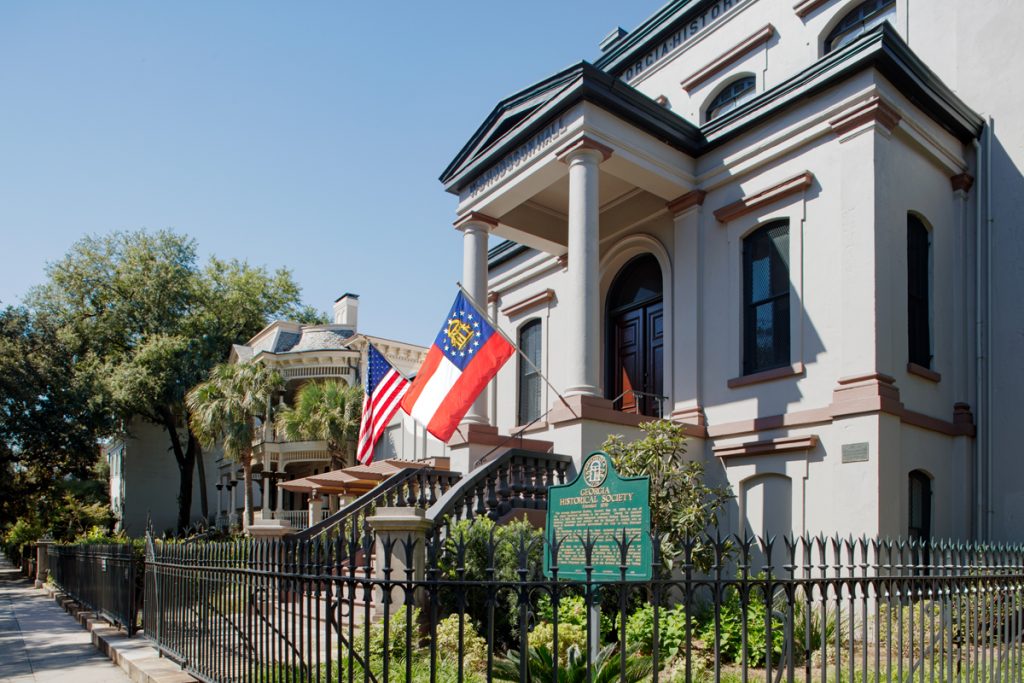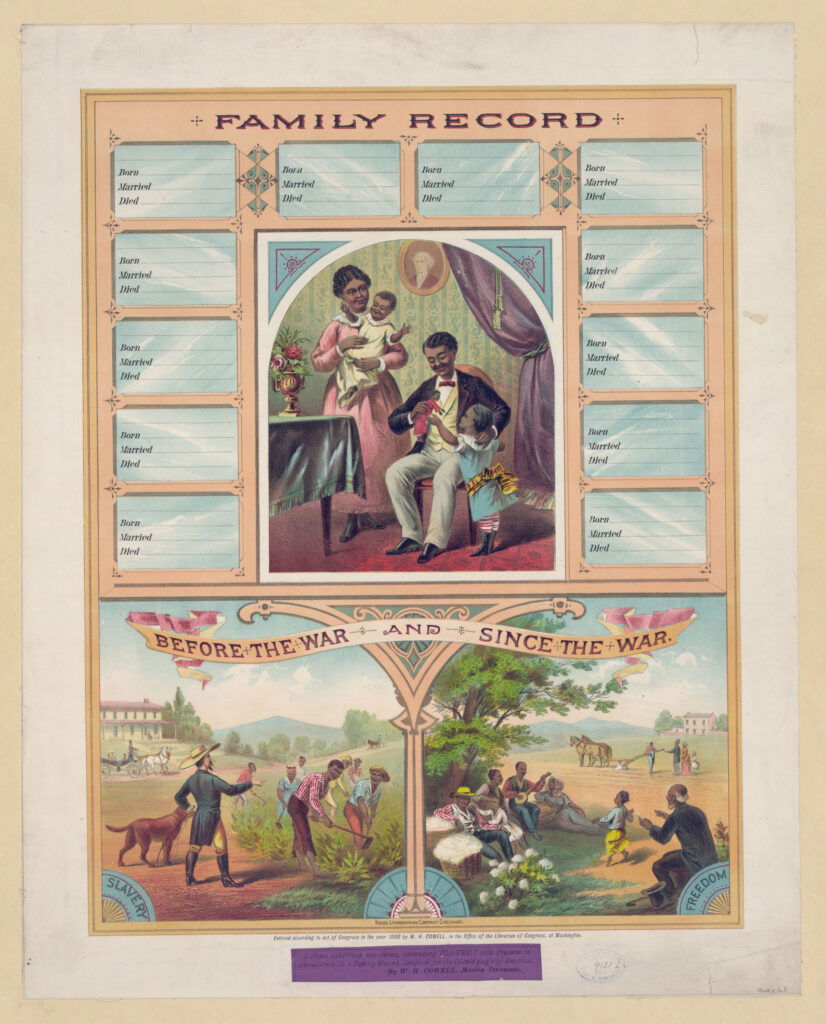Genealogy, or the research of family history, is a far different field of inquiry in the twenty-first century than it was in the past. Viewed as the pursuit of a great and noble heritage, genealogy was earlier treated as a hobby and a pastime, especially in the nineteenth and early twentieth centuries. However, genealogy is also the personal history of ordinary people, and each person has a unique genealogy.

Courtesy of Library of Congress, Prints and Photographs Division
Genealogical research provides the backbone of all human history and, when carefully done, can elucidate larger historical events. Studying, for example, the War of the Roses in fifteenth-century England requires a study of the major participants’ family histories. So, too, the histories of several families are of particular importance to Georgia’s history: genealogy illuminates the historical links between the Marburys of Augusta, the Telfairs of Savannah, the Cobbs of Athens, and the Woodruffs of Columbus and Atlanta.
Genealogy’s Evolution
Tracing one’s genealogy to prove important lineage was critical during the age of nobility. In England, for instance, a royal family’s right to the throne was secured through genealogical research, which provided information about ancestry, marriages, and descendants. Proving a family’s nobility through ancestry and marriage persisted into the twentieth century, at which time genealogical research moved from being the work of such societies as the United Daughters of the Confederacy and the Daughters of the American Revolution to becoming a pastime of amateur family historians. Divorce and children born out of wedlock evolved from being taboo topics into being integral elements of a genealogical record.
By the late twentieth century, a number of strong genealogical societies existed in Georgia. These include the Georgia Genealogical Society (founded in 1964), which takes a statewide focus, and such regionally based organizations as the Southwest Georgia Genealogical Society (founded in 1968), the Central Georgia Genealogical Society (founded in 1978), and the Augusta Genealogical Society (founded in 1979). Each group publishes a journal; maintains separate research publications, guidebooks, or annals; and hosts speakers and special events. Most have ties to a larger genealogical collective, to which they donate publications or act as an informal or even an official friends’ group.
Specializing in Georgia
The advent of genealogical societies in Georgia spurred the growth of major genealogical collections in the state’s public libraries. These collections specialize in Georgia’s history, but they also include a large number of books, microfilm, and periodicals representing other states and regions. Libraries in Athens, Atlanta, Columbus, Macon, Marietta, Rome, Savannah, Smyrna, and Thomasville house some of the best collections. Several individual genealogical societies, including the Augusta Genealogical Society, have created their own libraries. Private citizens fund other libraries, such as the Ladson Genealogical Library in Vidalia, which is a branch of the Vidalia-Toombs County Library, and private donations support others, including the Ellen Payne Odom Genealogy Library, which is attached to the Moultrie–Colquitt County Library.
The Georgia Historical Society in Savannah (founded in 1839) owns one of the state’s largest genealogical collections. The Georgia Division of Archives and History in Morrow (founded in 1918) touts a vast collection of Georgia-published books, microfilm of Georgia’s county courthouse records, a large family-history book collection, and published genealogical materials for other states, as well as Georgia’s official records, including land records, which are vital to genealogists. Located next to the Georgia Archives facility is the National Archives

Courtesy of Georgia Historical Society.
Another important genealogical institution in Georgia is the R. J. Taylor Jr. Foundation in Atlanta, which was created in 1971 to fund the publication of original genealogical materials dating from before 1851. Through this organization hundreds of important Georgia genealogical materials have been published—most recently, county marriage records, county cemetery books, and abstracts of Georgia newspaper records, which are another major source for historians.
Going Online
The Internet has added a new dimension to genealogy research. Every county in the United States has a genealogy Web site through the USGenWeb program. These sites link researchers to county societies, books, others doing research on the same names, and actual records for a specific county. The Church of Jesus Christ of Latter-day Saints (whose members are unofficially known as Mormons) maintains a genealogy Web site, which provides access to records and family trees from all over the world. The Georgia Death Index, spanning 1919 to 1998, is found online and links researchers to a vast amount of related material. The Ancestry Library Edition, a version of the ancestry search tool available on the Georgia Death Index site, is available in all the state’s public libraries through the GALILEO site.
The Six Rs of Genealogy
Genealogical research consists of six basic steps, or the “Six Rs” of genealogy:
—request information through interviewing relatives;
—record the findings at each step, using genealogy computer programs, charts, or handwritten notes;
—research by visiting courthouse sources or other original records or libraries;
—read about an era or area’s background through a good county or city history to gain a better understanding of ancestral and historical circumstances;
—review and revisit previous work, performing the same steps as needed to fill in genealogical blanks and extend a family’s recorded history farther back in time; and
—decide whether the results will produce a published book, a family reunion, or a genealogy family tree program.
From Roots to Trees
The book Roots by Alex Haley and the 1977 television show based on the novel attracted large numbers of people to genealogy, especially inspiring African Americans’ interest in researching their family history and lineage. Several attempts to form African American genealogical societies in Georgia have been made, leading to the establishment of the Metro Atlanta Chapter of the Afro-American Historical and Genealogical Society, Inc. The Atlanta-Fulton Public Library System provides another resource through the Auburn Avenue Research Library on African American Culture and History. But for the most part, little genealogical raw data has been published for Georgia’s African Americans, who must rely on such basic sources as the U.S. census, county records, and the Georgia Archives’ microfilm collection.

Courtesy of Library of Congress, Prints and Photographs Division































